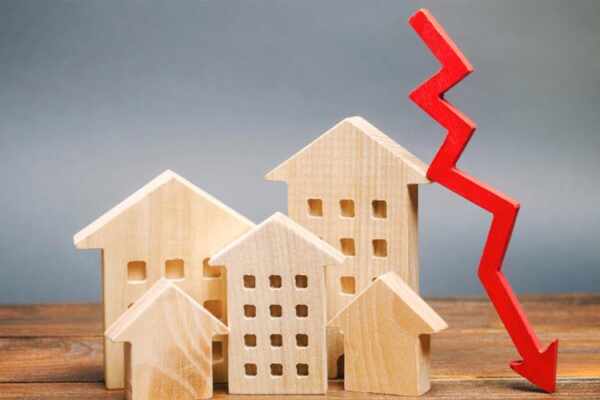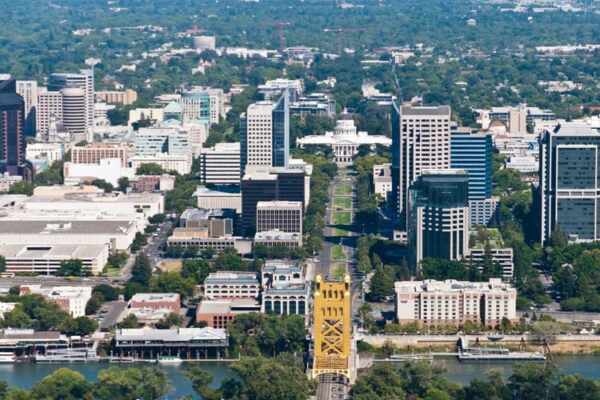What Happens When You Do Not Pay Property Taxes?
Property taxes are a chief source of income for local governments. They collect the taxes to fund events, projects such as hospitals, schools, etc. Moreover, that money is also used to pay municipality employees such as firefighters, police, and public office departments. Hence, people must pay property taxes to benefit society in a greater way. But, there are certain states in the United States with almost no property tax. Hence, in today’s article, we will talk about states with no property tax.
You might have to pay a modest property tax amount depending on where you live. According to the Tax Foundation, in 2018, the mean effective property tax rate was 1.11%. The mean effective property tax rate is the total of real estate taxes divided by your total home value. In the United States, Hawaii had the lowest property tax, i.e., 0.30%. And New Jersey had the highest property tax of 2.21%.
Now, every state has a property tax. No state does not levy property taxes on you. But, if you can meet specific requirements, you have to pay a low property tax. Individual states have property taxes below 1%. Below we have mentioned all the states with less than 1% property tax. Hence, check out the list and see where you can be a successful homeowner.
But, first, let’s clear out a few things below. Then, we can move on to finding out the states with no property tax.
Table of Contents
What is Property Tax?
The real estate property tax is levied on immovable property. Now, immovable properties mean the structure or land attached to the ground and cannot move, such as houses, buildings, or any other sort of land. Property tax is a regressive tax.
What is a regressive tax?
A regressive tax is the type of taxation where the tax rate decreases while the taxable amount diminishes. Hence, this type of tax puts a burden on low-income earners. The tax is levied on the purchases a person makes. Therefore, taxation increases with the increase in the taxpayer’s income.
Examples of regressive taxes are excise taxes, sale taxes, property taxes. Remember that the excise taxes are fixed and are included in the product or service’s price.
So, if a buyer pays a 6% tax on whatever he is buying, and his income is $30,000, he is paying more than the buyer who is buying the same stuff and earning $130,000.
If someone is earning $30,000 a year and paying $1500 as tax, he is giving 5% of his income to taxation. Whereas, a person who is earning $100,000, paying $1500 as tax, is just contributing 1.5% of his income to tax. Therefore, a person having a higher income is paying a lesser tax than the person who is earning less. This is what a regressive tax is.
Getting back to where we started!
So, in the case of property tax, the regressive tax is charged on your owned property. It is levied by the jurisdiction or local government where it is located. When you own an investment property or a home, you pay tax indirectly with a monthly mortgage payment or directly to the local tax accessor.
Property tax is wholly based on the investment property value. And it considerably varies from state to state. Hence, property taxes can be a little inconvenient for you or can be a significant burden as well, depending on where you stay and the kind of property or investment you own. So, you can calculate your property tax by multiplying the property’s value with the property tax rate. As per U.S. Census Bureau, an average American spends $2,325 each year on property taxes.
How does Property Tax affect Investors?
If you do not know, let us tell you that there are various expenses related to owning a property. So, you must try looking for states with no property tax. Now, you have to keep this mind that rent property expenses considerably vary in amount. This depends on the money you need to spend. Examples of such are repairs and renovations. While these expenses vary from time to time, certain expenses are always fixed. The fixed expenses include property tax and mortgage payments.
There is a considerable effect on the cash flow of the rental property. Now, it is no new fact that every property owner or investor wants to have a positive cash flow to cover the rental property expenses. They want to have enough cash flow that could cover their expenses and spare some bucks for their pockets. So, for generating positive cash flow, you must invest carefully. You must invest in properties of states with less property tax. You must invest in low and tax-friendly states.
Moreover, the fact that taxes vary considerably from state to state forces investors to invest in their state. Therefore, before you invest in a property, you must check the local government levies’ tax rate on your property.
States with No Property Tax. Do they exist?
There is nothing such as states with no property tax. Every state on this planet charges tax on real estate properties. As already mentioned, this money is used to fund constructions, pay municipality employees’ salaries, etc.
Now, why are we using the phrase states with no property tax? Well, this phrase is used for states with the lowest property tax rates. In those states, the property tax rate is so low that it neither affects positive cash flow nor investment return.
As the local government has its expenses and has to pay salaries, there is no tax rate, but the government will manage it somewhere else. They may charge higher costs in other segments. Hence, even though you may have to low tax amount, you may incur a higher expense on different segments.
So, let’s check out the ten states with no property tax.
10 States with the Lowest Property Taxes
1. Hawaii
- Effective Property Tax Rate: 0.27%
- Median Home Value: $587,700
- State Median Home Value Annual Taxes: $1,607
Hawaii is located in the Pacific Ocean. It is the United States of America state. It is the only island in North America. Hawaii has 137 islands. The islands are volcanic and places of interest for many tourists. Hawaii has no majority of racial-ethnic groups.
Moreover, it is one of the most-densely U.S. states. If you are thinking of a vacation, then there is no better place than Hawaii. But, what about owning a property?
Well, you can easily own a property in Hawaii. It has the lowest property taxes in the U.S. But, keep in mind that it does have the highest median home value. Hence, this can affect your income flow. Moreover, Hawaii ranks second in the highest income tax. A rental property owner receives $2,261 monthly rent in Hawaii.
Therefore, if you have always dreamt of owning a house near the beaches, especially in Hawaii, then your dream can come true. You do not have to worry about the property tax. But, yes, the median home value and income tax are matters of concern.
2. Alabama
- Effective Property Tax Rate: 0.42%
- Median Home Value: $137,200
- State Median Home Value Annual Taxes: $572
Alabama is a completely landlocked country in the Southern United States of America. It is bordered in the North by Tennessee, South by Gulf of Mexico and Florida, East by Georgia, and Mississippi on the West. It is the 24th most populous in the U.S. Alabama has great weather throughout the year. Moreover, what’s interesting is, it has one of the lowest costs of living. The employment opportunities are great, and it has some excellent universities and colleges as well. It is an amiable state and a great place to raise your kids as well.
Alabama also has the lowest real estate prices. According to statistics, Alabama residents pay just $572 as annual taxes. It is way lower than what we saw in Hawaii. The property tax is also meager. All credits go to below-average home values.
Moreover, the Alabama housing rates are one of the most affordable in the U.S. The monthly rental gives you $1,174 when you own a rental property. Hence, this does have a positive flow of income. Therefore, Alabama is a great combination of low property tax and high rental income.
3. Colorado
- Effective Property Tax Rate: 0.53%
- Median Home Value: $313,600
- State Median Home Value Annual Taxes: $1,647
Colorado is a western United States of America state. It is encompassed by Southern Rocky Mountains and the Colorado Plateau. It is a landlocked country as well. Colorado ranks 21st in the most populous state of the U.S. Colorado is seeing a peak in its residents and rapidly moving to Colorado. People who want to stay near the mountains are packing their bags and leaving for Colorado. Though the weather changes quickly, it is considered one of the best and most beautiful places to live in the U.S. Moreover, Colorado has great services and job growth as well.
As mentioned earlier, as more and more people are moving to Colorado, the state is also experiencing a rise in the housing market. The low property tax attracts people to the state. The low property is a significant motivator for people looking for affordable living and low taxes. Though, the median home value is relatively high, which might discourage some people. A rental property can give a resident $1,935 as a monthly rent payment. Nonetheless, it is a fantastic place to invest in property.
4. Louisiana
- Effective Property Tax Rate: 0.53%
- Median Home Value: $157,800
- State Median Home Value Annual Taxes: $840
Louisiana is a southern state of the United States of America. It has the Gulf of Mexico to the South, in the East, it has Mississippi, in the north, Arkansas, and Texas in the West. Louisiana is the 25th most populous state in the U.S. Louisiana is considered to have the best living environment. Moreover, it is also considered the happiest state in the U.S. Hence, Louisiana is one of the best states to grow your family. Just not a healthy living environment, Louisiana has the lowest cost of living as well. Moreover, as per statistics, it has the lowest property tax rate as well.
There are many benefits to buying a property in Louisiana. Louisiana has a low property tax rate, but it has the lowest cost of living as well. So, when you buy a property in Louisiana, you ensure that you have a positive flow of income. Moreover, prices and home values are very affordable as well. It is seen that a rental property can give you monthly rent of $1,332. So, if you have been planning to have an affordable living for a long time and buy property, then there is nothing better than investing in a property in Louisiana.
5. District of Columbia
- Effective Property Tax Rate: 0.55%
- Median Home Value: $568,400
- State Median Home Value Annual Taxes: $3,113
District of Columbia or Washington D.C. is considered a great place to live in. It is the United States of America capital and the 4th best place to live in the U.S. It has great job prospects, amazing education quality, and a great quality of life. Moreover, the affordability rate in D.C. is high as well. The D.C. community is small and close-knit. People gather for block parties, for strolling their dogs in the park, and have a healthy conversation at coffee shops at well. Not only D.C. is the political hub of the U.S. but cultural hub as well.
D.C. has a homestead deduction policy, and this considerably lowers the amount of property tax. The property tax is very low in D.C. Though it has a considerable high tax rate as per this list, D.C. has a limited increase in taxable assessment. Therefore, it does not matter how much your property grows in a year; your taxable portion will not grow over 10%. A rental property owner receives $2,602 monthly rent in D.C. Therefore, D.C. is one of the best capitals and states with no property tax to live in.
6. Delaware
- Effective Property Tax Rate: 0.56%
- Median Home Value: $244,700
- State Median Home Value Annual Taxes: $1,377
Delaware is a small mid-Atlantic state in the United States of America. It has the Atlantic Ocean in the East. Moreover, it has New Jersey on the East, Pennsylvania on the North, and Maryland on the West and South. Delaware does have not only beautiful beaches but also has diverse educational opportunities. You are starting from great public and private high-schools to great public and private universities. Moreover, you can reach a cultural hub whenever you get out in a car or bicycle. You will always stay connected to the Delaware community wherever you buy a property.
Nonetheless, Delaware is a very tax-friendly state. It has a 0—56% property tax rate. Moreover, the local government relies the least on property taxes. Hence, you have less pressure on the property tax. But, do remember, the income tax rate is considerably high in Delaware. If it is your first time buying a property, you will get a $2000 a year credit in federal income tax. Therefore, buying a property in Delaware is a great decision. A rental property owner receives $1,544 monthly rent in Delaware.
7. South Carolina
- Effective Property Tax Rate: 0.57%
- Median Home Value: $154,800
- State Median Home Value Annual Taxes: $887
South Carolina is in the Southern United States of America. It has North Carolina to its North, the Atlantic Ocean to its South East, and Georgie on the South West. It is situated in the Deep South region. South Carolina is considered highly inexpensive. People move to South Carolina quite often, making it the 23rd most populous state in the U.S.A. The weather is pleasant and great. You can find seafood everywhere you go. South Carolina is a very affordable state, and you can save extra bucks every month.
Though South Carolina has a higher property tax than the states mentioned above, it has quite low home value. Carolina home values are very affordable. Hence, property holders and residents do not pay very high property taxes per year. So, this attracts a lot of investors to South Carolina. As mentioned earlier, South Carolina is the 23rd most populous state, and the low property tax makes it clear why it is among the most populous states. Moreover, a rental property can earn $1,333 to a rental property owner. Therefore, this makes South Carolina one of the best states with no property tax.
8. West Virginia
- Effective Property Tax Rate: 0.59%
- Median Home Value: $115,000
- State Median Home Value Annual Taxes: $678
West Virginia is a great state with beautiful scenery and a very low cost of living. West Virginia is again a completely landlocked state. It has various states covering itself from all sides. It has Ohio, Maryland, Pennsylvania, Virginia, and Kentucky covering it from all sides. Not only the property tax is very low, but the groceries also cost 18% less than D.C. Moreover, healthcare is very affordable as well. Hence, living in West Virginia is a perfect fit for people who want to buy a property and still live within the budget.
West Virginia is undoubtedly one of the best states to invest in a property. The low property tax in this state appeals to both out-of-states investors and residents as well. The median home value is also less compared to other states. This makes West Virginia quite popular and a favorite among people. The average West Virginia monthly rate is $1,098. Therefore, when you buy a property in Virginia, you get the property with low tax and affordable living.
9. Wyoming
- Effective Property Tax Rate: 0.61%
- Median Home Value: $213,300
- State Median Home Value Annual Taxes: $1,298
Wyoming is the 10th largest state in the United States of America. It is an entirely landlocked country. It is surrounded and locked by Colorado, Utah, Nebraska, South Dakota, Idaho, and Montano. Wyoming enjoys four seasons. Hence, you enjoy different activities like fishing, hiking, skiing, hunting, and a lot more. A lot of states in the U.S. do not enjoy varied seasons, but Wyoming does.
Moreover, Wyoming has excellent nature, and you do it out any time to grab a fresh breath of air. Wyoming also has a varied food culture. Hence, you enjoy anything.
Another bonus of Wyoming is its low taxes. It has one of the lowest property taxes in the U.S. Moreover, the median home value is considerably low as well. Furthermore, the sales tax of this state is below the average level in the U.S. as well. Hence, this makes Wyoming’s cost of living significantly less. The rental income of Wyoming is $1,553. Therefore, this makes the rental income one of the highest on this list. Hence, it is a great decision to invest in Wyoming’s real estate.
10. Arkansan
- Effective Property Tax Rate: 0.63%
- Median Home Value: $123,300
- State Median Home Value Annual Taxes: $776
Arkansas is again a South-Central landlocked state in the United States of America. It is the 33rd most populous U.S. state. Arkansas experiences excellent weather throughout. Hence, you can pick up any outdoor activity of your choice. Arkansas is a very friendly state.
Moreover, the cost of living is very low. Hence, making it a great place to raise a family. Also, the real estate cost is very low as well. You will get property in significantly less amount, especially in the rural parts of the state.
The home prices are affordable, and the economy is growing as well. Moreover, this state has the lowest mortgage rates as well. The median home value is low as well. You can also expect a $1,524 rental income. The values are quite appreciating. Hence, this makes Arkansas an excellent place to buy a property.
Therefore, these are some of the states with no property tax. Though there is nothing as no tax, these states have the lowest property taxes in the United States of America. Hence, if you have been planning to invest in real estate for quite a long time, then invest in one of the above-listed states.
What Will Happen if You Do Not Pay Your Property Tax?
So, what happens if you don’t pay property taxes? Well, then you can lose your beloved property to a tax sale. Yes, you will end up losing your property to the government. To satisfy the debt, then the taxing authority can sell your property. This can be through a foreclose process. Or you can be able to foreclose as well, if the tax authority sells the tax lien, the authority holds.
Moreover, the loan servicer can sometimes advance the funds to pay the taxes. Later on, you will be forwarded the bills. And, if you fail to pay the bill as well, then the loan servicer will have all rights to foreclose your property. So, first, let’s start by understanding tax lien and property tax.
Tax Liens and Property Taxes
By now, you must have known and understood that people owning property have to pay a property tax. As mentioned earlier, the property tax you and others pay to fund a lot of activities. These activities include libraries, schools, parks, roads, and other government services. The tax amount due is completely based on your home’s or property’s accessed value. Hence, it can vary from person to person.
Moreover, a loan servicer may also collect the property tax from you, then pay the government as a monthly mortgage payment on behalf of you. This will be done through an escrow account. If the property tax is not paid or collected through an escrow account, you have to pay the tax by yourself. We have explained what an escrow account below is.
If you cannot pay the property tax, then the delinquent amount will become a lien on your home.
What is a property tax lien?
A lien attached to a property will put others on notice that you owe money to the creditor. So, before you sell your property or give your buyer a title, you have to clear the liens. If you cannot pay the property tax, then the local government will sell your property to pay the tax. So, the state or the local government will follow all the rules to sell your property. But, if you can pay the taxes and the costs, you can have your property or home back later on, even after the “sale.” If you cannot pay the tax or taxes for protecting its mortgage, then the lender will pay the tax and later on add to your mortgage amount.
Holding a tax sale
The government of the state can hold a tax sale on your property. Once your property is on a lien, the government can sell your property, quite identical to the foreclosure sale. The two very basic types of tax sales are tax lien certificate sales and tax deed sales.
Tax lien certificate sale
Now, in this tax sale, the tax authority sells the lien. And, the purchaser gets hold of the right to collect the debt along with interests and penalties. If the delinquent amounts are unfortunately not paid, then the purchase can follow other procedures or foreclose for converting the certificate to a deed.
In individual states, a sale is not conducted. In such a case, the tax authority executes the property tax lien and takes the home title. The state law then allows the taxing authority to dispose of the home or the property by selling it. On certain occasions, the tax authority holds a foreclosure before having a property sale.
Tax deed sales
In this sale, the tax authority sells the property. And the purchaser gets the property’s deed. Hence, there is no foreclosure process.
How can you redeem your property before or after the sale?
If you lose your property to sale in many states, you can repurchase the property. So, you can do this by paying the amount to the buyer within a specified time along with the interests. Now, how long the redemption period will last will vary from state to state. But, generally, property owners have at least a year to redeem the lost property. Also, in individual states, the redemption period is before the sale.
When the loan services may foreclose
Property liens are always superior to other liens. A property tax lien has very much importance, so if your property is sold via tax sale, then the sale will wipe out all mortgages. Hence, the loan servicer will advance money to pay the delinquent property tax. So, this will prevent the tax sale. Now, later on, your loan servicer will ask for reimbursement from you.
The terms of the contract include staying of the borrower on the current property taxes. Now, if you fail to pay, then you will be a defaulter as per mortgage terms. Then, the loan servicer will foreclose on your property.
How to Set up an Escrow Account
Besides asking you for repayment of the paid amount, plus taxes, interests, and penalties, your loan servicer will set you up an escrow account.
Whats an escrow account?
On a mortgage escrow account, the borrower will have to pay the property taxes, private mortgage insurance, homeowners’ insurance, and homeowners’ association dues. These are collectively called “escrow items.” The loan servicer then pays the expenses as due bills. So, when you have an escrow account, it is made sure that all the bills, taxes, and others are paid on time.
How much you have to pay?
So, it is the 1/12th amount of the estimated annual property taxes’ cost. Also, this might include other expenses like insurance or monthly principal and interest. All this money goes into the escrow account.
What are the pros and cons of having an escrow account?
The con of having such an account is that you will be paying a larger amount to your loan servicer each month. On the optimistic side, having an escrow account will save you from the large amounts when your tax bills are due.
Why set up an Escrow account?
Your service has the utmost right to set up an escrow account. There are certain mortgage clause allows the lender to set up an escrow account. Hence, the servicer sets up the account and also manages on behalf of the lender.
If you want to know when your lender can set up an escrow account, you have to read your contract and other essential documents you have signed as an escrow waiver.
Final Thoughts!
We hope that we have answered all your queries regarding what happens if you don’t pay property taxes. Moreover, when you pay the property in any of the states with no property tax, it becomes very easy to pay the taxes. The property tax is very low. Therefore, enabling a positive cash flow. Hence, you must look for property in low property tax states and pay the tax on time.










